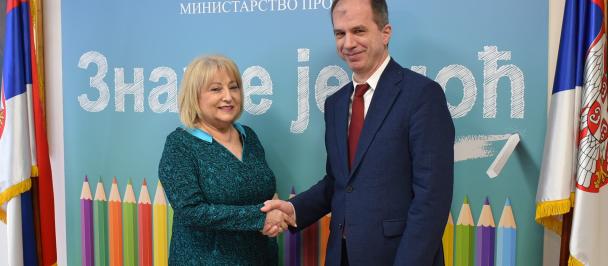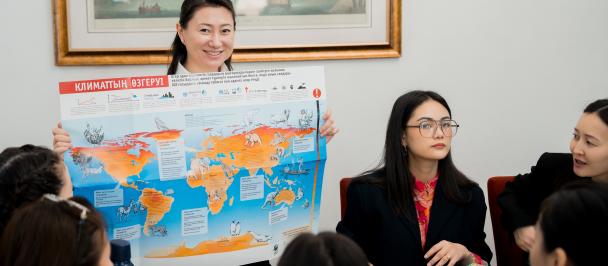AUC and UNDP deepen collaboration on resilience building in Africa
February 18, 2023
Ms. Ahunna Eziakonwa, UNDP's Assistant Administrator and Regional Director for Africa (left) met H.E. Amb. Josefa L.C. Sacko, Commissioner, Department of Agriculture, Rural Development, Blue Economy and Sustainable Environment at AUC (right) on the margins of the 36th AU Summit
The African Union Commission (AUC) and the United Nations Development Programme (UNDP) have agreed to strengthen their ongoing partnership in resilience building in Africa. H.E. Amb. Josefa L.C. Sacko, Commissioner, Department of Agriculture, Rural Development, Blue Economy and Sustainable Environment (ARBE) at the African Union Commission (AUC) met Ms. Ahunna Eziakonwa, UNDP's Assistant Administrator and Regional Director for Africa on the margins of the 36th AU Assembly (Heads of State and Government session).
Commissioner Josefa Sacko commended the strong partnership between the two institutions, describing it as a game changer. She hailed the Sahel Resilience Project as a catalyst for resilience building in the Sahel and the broader continent. "Together with UNDP, AUC has developed the Africa Urban Resilience Programme set to be presented for technical validation by Member states in February," she highlighted.
The Commissioner further explained that the cooperation with UNDP allowed for the development of two continental frameworks, the COVID-19 Recovery Framework for Africa and the institutional and operational framework for the Africa Multi-Hazard Early Warning and Early Action System, and contributed to building the Commission's institutional capacity in urban resilience, disaster risk communication, and in monitoring the Sendai Framework for Disaster Risk Reduction and the progress of the Africa Programme of Action in West Africa and Sahelian countries.
"AUC and UNDP are in the advanced stage of implementing joint programmes in urban resilience, climate governance, Great Green Wall, and blue economies, as the two organizations enjoy cordial relations based on mutual respect and recognition of comparative advantages offered by both institutions,” the Commissioner acknowledged.
Ms. Eziakonwa thanked the Commissioner for a continued and fruitful collaboration. "Through our country presence and leveraging the Regional Collaborative Platform (RCP), UNDP stands ready to mobilize the UN system to support the implementation of the African Union’s frameworks and facilitate their implementation by Member states,” she said.
Amb. Sacko and Ms. Eziakonwa discussed several areas within the existing frameworks. These include continued collaboration on existing projects and programmes in disaster risk reduction and other joint areas, including blue economy, climate change, and the Great Green Wall Initiative.
The two leaders discussed the need to work together on the ongoing Africa Borderlands programme implemented by UNDP, which aims to transform security, economic and environmental vulnerabilities in borderland regions of the Horn of Africa, the Sahel and the Lake Chad Basin into opportunities for inclusive development.
Amb. Sacko indicated that AUC, within the framework of the Comprehensive Africa Agriculture Development Programme (CAADP) is working on food security and animal resources management. She urged UNDP to join forces with AU Inter-African Bureau for Animal Resources (AU-IBAR) on the animal resources component, as the UN development agency is implementing several projects in the sector.
Amb. Sacko and Ms. Eziakonwa discussed the need for an African Union carbon credit facility as the two organizations look forward to working together in advancing common areas of collaboration in climate change towards the 28th Conference of Parties to the United Nations Framework Convention on Climate Change (COP28). The two leaders also discussed the need to form a joint task force to develop concrete proposals for Africa as the continent prepares for COP28.
Other areas of interest discussed included the training of Member states in access to climate finance, loss and damage data, and support for the operationalization of the climate commissions. These include the Sahel, Congo Basin and Small Island Commissions.

 Locations
Locations



